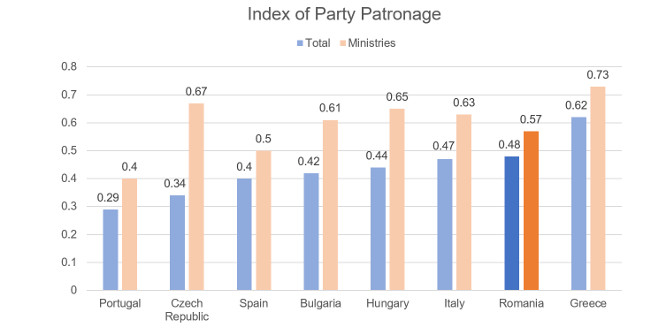Delegation can improve the efficiency of policymaking and generate a sense of shared responsibility. Yet when it goes wrong, it can undermine accountability, create conflicts, and aid corruption. Drawing on a new book, Neil Mitchell explains how delegation can be used to manage blame, and why accepted accounts of the principal-agent relationship are incomplete.
Dominic Raab, the now former UK Foreign Secretary, was surprised while holidaying in Crete by events in Afghanistan. He returned, unrefreshed, to face calls for his resignation. The evacuation of Kabul became a last-ditch effort to safeguard some of the desperate people who had helped the UK over the previous 20 years. Others were left behind. Documents identifying Afghans who had contributed to the British war effort were left in the embassy for the Taliban to find and there were problems with visa procedures.
Raab was in Crete when he was advised to phone his Afghan counterpart. He later said he had ‘delegated’ the call to a junior minister. But it turned out that there was no call at all because of the ‘deteriorating situation.’ When questioned about those left behind in Kabul on the Radio 4 Today programme and in the House of Commons, the Foreign Secretary shifted responsibility to the intelligence services that got the fall of Afghanistan ‘clearly wrong,’ despite, as was pointed out to him, early warnings from within his own department predicting a rapid Taliban advance and a July letter to the Times by retired senior officers condemning a lack of ‘generosity and urgency’ in the British response. The Daily Telegraph commented that Raab had failed to ‘step up’. He was ultimately replaced as Foreign Secretary in a cabinet reshuffle on 15 September.
Why delegate?
In a new book, Why Delegate?, I look at other examples of failures to step up by exploring the diverse and sometimes devious incentives to delegate. Leaders, or principals, have probably always used delegation to protect their power and position. Indeed, they have long been advised to do so. Machiavelli admired Cesare Borgia, who, in 1502, delegated blame for the use of cruelty to his Spanish minister and held him accountable. The author of the Prince, writing about the event a few years later, describes the subsequent execution of the minister, which apparently met with public approval.
Among other illustrations, there are the top managers at Volkswagen, who tried to ride out the Dieselgate pollution scandal by shifting blame down to their subordinates. The scandal centred on software installed in vehicles that could identify when emissions testing was being undertaken and only then engage pollution controls. Out on the road, with the controls switched off, the affected vehicles would pump out up to 35 times more respiratory disease-causing nitrogen oxide.
When an inquisitive environmental group, the International Council for Clean Transportation, discovered the ‘defeat device’ and blew the whistle, the head of Volkswagen in America, Michael Horn, testified before Congress. He said that it was neither his nor the company’s responsibility, but rather that of a couple of runaway software engineers. The man at the very top, Volkswagen CEO Martin Winterkorn, was also surprised by what had been done to the company’s cars by his employees from at least 2009 to 2015. A New York Times investigation later revealed that the ‘rogue’ engineers had sought approval from top management from the beginning.
Principals, agents and passing the buck
The world turns on the delegation relationship. Social, economic and political life is inconceivable without it. When delegation goes well, it brings efficiency, a sense of shared responsibility and even happiness. A recent study by an international team of social scientists shows that spending money on delegating menial tasks beats a bottle of wine. But when it goes badly, it brings conflict, corruption, a lack of responsibility and moral decay.
The underlying structure of the delegation relationship is described by principal-agent theory. Conventionally, economists view the relationship from the principal’s perspective. They focus on the efficiency incentives to delegate, describe the principal-agent problem as the difficulty of those in charge ascertaining an agent’s trustworthiness and knowing how well they fulfil a task and, in the principal’s interactive relationship with the agent, anticipate what measures might protect principals from an agent’s opportunistic behaviour.
But as one moves from efficiency calculations to political calculations and saving face and managing blame, neither side in the delegation relationship can be trusted. The software engineers, hired to write code, were tasked with the blame. Although not part of the contract, blame is a task that the principal may opportunistically allocate the agent when surprised by an unexpected contingency or a whistleblower turns up. Shocked by the turn of events, self-interested individuals seek to evade responsibility and blame.
Delegation allows those in charge to shift responsibility to underlings and distance themselves from what went wrong in order to avoid unpleasant reputational, financial, legal or personal consequences. There is some troubling experimental evidence that delegation may also allow individuals to put psychological distance between themselves and the wrongdoing and thus avoid an uneasy conscience. Blame may be the least explored of the incentives to delegate by economists, but Adam Smith, at least, did not underestimate the power of the ‘dread of blame.’ To evade this dread, we delegate down the organisation.
Sometimes it is difficult to predict which tasks will be delegated, and sometimes we should delegate more than we do. Despite the other calls on his time, President Jimmy Carter was reported to be unwilling to delegate the scheduling of the White House tennis court. But carrying off the blame is one task leaders often decide to pass on to an agent. But it is a choice. It has been pointed out that one of Dominic Raab’s predecessors as Foreign Secretary, Lord Carrington, surprised by the intelligence failure to anticipate the invasion of the Falklands in 1982, ‘stepped up’ by stepping down along with his two junior ministers.
For more information, see the author’s new book, Why Delegate? (Oxford University Press, 2021)
Note: This article gives the views of the author, not the position of EUROPP – European Politics and Policy or the London School of Economics. Featured image credit: Simon Dawson / No 10 Downing Street (CC BY-NC-ND 2.0)




